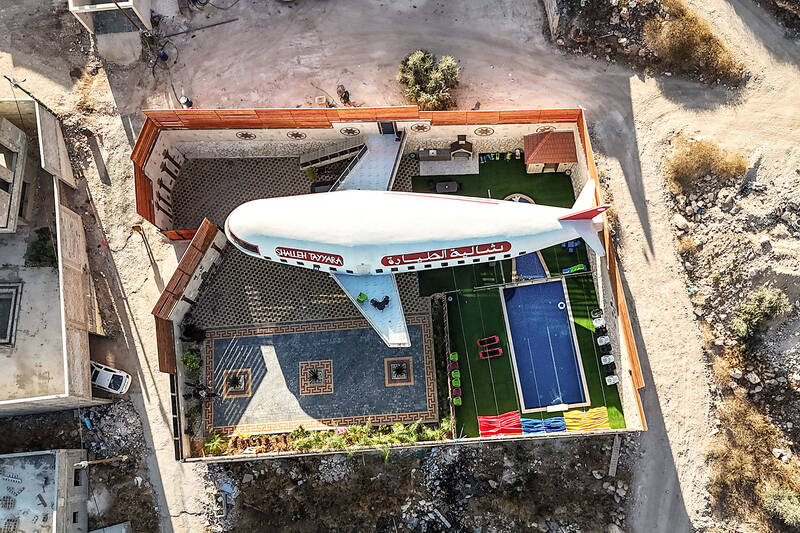A guest house in the shape of a plane would stand out anywhere in the world, but in the occupied Palestinian West Bank devoid of airports, Minwer Harsha’s creation helps aviation dreams take flight.
“So many kids want to come,” said 27-year-old Harsha, who built the guest house in the hills of the northern West Bank, within view of the separation barrier between Israel and the Palestinian territory.
“And that’s the goal: since we don’t have planes or airports, people come here instead,” he said

Photo: AFP
Harsha said he designed the concrete plane himself, with a master bedroom in the cockpit and a children’s bedroom in the tail.
The price tag, between 1,000 and 2,000 shekels (US$296 to US$593) per night, is out of reach for most Palestinians, particularly as unemployment soars due to the war in Gaza.
He has nonetheless been pleased with the reactions to his chalet, having initially faced skepticism.
“I wanted to bring something unique, something new to the area and to Palestine,” Harsha said of the unit, which opened a month ago.
Since its launch, his red and white concrete plane has become a local landmark, featuring in local media and on social networks.
Harsha said he originally wanted to place a Palestinian flag on his chalet and call it the “Palestinian Queen,” but avoided such signs out of caution.
OBSTACLES
The guest house is in the West Bank’s Area C, which covers more than 60 percent of the territory and is under full Israeli control.
“I just made it look like a plane. I avoided politics entirely because of the hardships our people are going through,” he said.
“We’re a people who are constantly losing things — our land, our rights, our lives,” he added.
Israel has occupied the West Bank since 1967, and frequently demolishes homes it says are built without permission in the mostly rural Area C.
Although no airport currently services the Palestinian territories, both the West Bank and Gaza once had their own terminals, in east Jerusalem and the southern Gaza city of Rafah respectively.
Both were closed during the Second Intifada, the Palestinian uprising of the early 2000s, and what remains of east Jerusalem’s airport is now isolated from the rest of the West Bank by Israel’s separation barrier.
HOPES
Despite difficulties and threats of demolition, Harsha believes that Palestinians can find freedom and fulfilment in projects like his.
“I encourage everyone who has land to work on it and invest in it — with creativity and ambition,” he said, flanked by his two brothers who helped him build the unit.
Harsha said that he has more plans for his land.
“After this aeroplane, we’ll build a ship next year,” he said.
“It will be something unique and beautiful,” he said, pointing out that while many West Bank Palestinians have seen planes flying overhead, a large number of people from the landlocked territory have never seen a real ship at all.

IN THE AIR: While most companies said they were committed to North American operations, some added that production and costs would depend on the outcome of a US trade probe Leading local contract electronics makers Wistron Corp (緯創), Quanta Computer Inc (廣達), Inventec Corp (英業達) and Compal Electronics Inc (仁寶) are to maintain their North American expansion plans, despite Washington’s 20 percent tariff on Taiwanese goods. Wistron said it has long maintained a presence in the US, while distributing production across Taiwan, North America, Southeast Asia and Europe. The company is in talks with customers to align capacity with their site preferences, a company official told the Taipei Times by telephone on Friday. The company is still in talks with clients over who would bear the tariff costs, with the outcome pending further

A proposed 100 percent tariff on chip imports announced by US President Donald Trump could shift more of Taiwan’s semiconductor production overseas, a Taiwan Institute of Economic Research (TIER) researcher said yesterday. Trump’s tariff policy will accelerate the global semiconductor industry’s pace to establish roots in the US, leading to higher supply chain costs and ultimately raising prices of consumer electronics and creating uncertainty for future market demand, Arisa Liu (劉佩真) at the institute’s Taiwan Industry Economics Database said in a telephone interview. Trump’s move signals his intention to "restore the glory of the US semiconductor industry," Liu noted, saying that

STILL UNCLEAR: Several aspects of the policy still need to be clarified, such as whether the exemptions would expand to related products, PwC Taiwan warned The TAIEX surged yesterday, led by gains in Taiwan Semiconductor Manufacturing Co (TSMC, 台積電), after US President Donald Trump announced a sweeping 100 percent tariff on imported semiconductors — while exempting companies operating or building plants in the US, which includes TSMC. The benchmark index jumped 556.41 points, or 2.37 percent, to close at 24,003.77, breaching the 24,000-point level and hitting its highest close this year, Taiwan Stock Exchange (TWSE) data showed. TSMC rose NT$55, or 4.89 percent, to close at a record NT$1,180, as the company is already investing heavily in a multibillion-dollar plant in Arizona that led investors to assume

AI: Softbank’s stake increases in Nvidia and TSMC reflect Masayoshi Son’s effort to gain a foothold in key nodes of the AI value chain, from chip design to data infrastructure Softbank Group Corp is building up stakes in Nvidia Corp and Taiwan Semiconductor Manufacturing Co (TSMC, 台積電), the latest reflection of founder Masayoshi Son’s focus on the tools and hardware underpinning artificial intelligence (AI). The Japanese technology investor raised its stake in Nvidia to about US$3 billion by the end of March, up from US$1 billion in the prior quarter, regulatory filings showed. It bought about US$330 million worth of TSMC shares and US$170 million in Oracle Corp, they showed. Softbank’s signature Vision Fund has also monetized almost US$2 billion of public and private assets in the first half of this year,